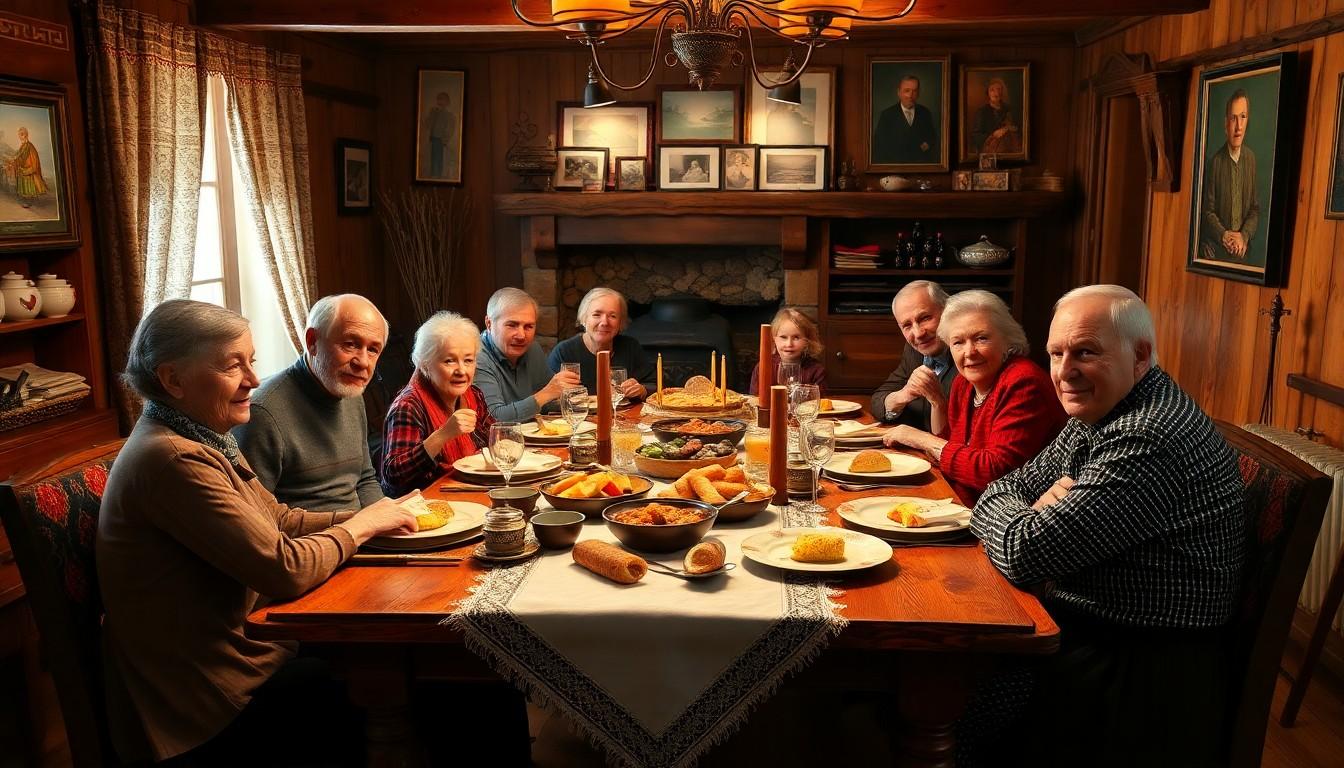Russian family traditions are a vibrant tapestry woven with history, humor, and heart. From the warmth of a grandmother’s borscht to the spirited toasts at family gatherings, these customs offer a glimpse into a culture that values connection and celebration. If you think your family game nights are intense, wait until you see a Russian family play “Who Can Drink the Most Vodka”—it’s a competitive sport!
Table of Contents
ToggleOverview of Russian Family Traditions
Russian family traditions reflect a deep-rooted cultural heritage characterized by strong connections and meaningful celebrations. Central to these customs is the family meal, often featuring iconic dishes like borscht and pelmeni, which symbolize warmth and togetherness. Special occasions usually bring families together, fostering a sense of unity and joy.
Holiday celebrations play a pivotal role in Russian family life. New Year’s and Christmas gatherings include sharing traditional foods, singing songs, and exchanging gifts, all of which enhance familial bonds. During these times, it is common for families to engage in games and storytelling, promoting laughter and connection.
Family rituals also include honoring ancestors. During holidays like Radonitsa, families visit graves, share memories, and offer food to commemorate loved ones, strengthening ties across generations.
Customs surrounding marriage further exemplify the significance of family. Traditional weddings often incorporate rites like the crowning ceremony, emphasizing the blending of two families into one. Family support in these moments showcases loyalty and collective joy.
Celebrations often involve toasts, with each toast conveying heartfelt wishes. Russians pride themselves on their storytelling capacity, enhancing the vibrant atmosphere during festive gatherings. Sharing personal stories and jokes exemplifies the lighthearted side of Russian family traditions.
Formal and informal gatherings blend seamlessly. Regular family dinners reflect the importance of daily interactions, reinforcing connections while fostering a nurturing environment. These traditions underscore the essence of Russian family life, highlighting diversity and depth within its cultural practices.
Importance of Family in Russian Culture

Family holds a central place in Russian culture, weaving together the fabric of social life through deep-rooted traditions and values.
Historical Context
Historically, family structures in Russia operated on strong ties and extended networks. Generations often lived together, fostering unity and shared responsibilities. Agrarian lifestyles meant collaboration in farming and household duties strengthened bonds. Major events like weddings and holidays served as communal gatherings, reinforcing the significance of family. During political turmoil, these familial connections provided essential support networks. Rituals and customs evolved over time, reflecting the resilience and adaptability of families in Russia. Legacies passed down helped maintain cultural identity through turbulent periods.
Modern Implications
In modern society, the essence of family remains vital despite urban migration and global influences. Contemporary Russian families prioritize strong relationships, often gathering for meals and celebrations. Traditional values still manifest during holidays, emphasizing unity and collective memory. Families now often engage in practices that blend modernity with heritage, such as enjoying traditional dishes while embracing contemporary dining trends. The importance of honoring ancestors persists, sustaining emotional connections through remembrance. Support systems are vital as families navigate the challenges of modern life. Overall, the role of family continues to shape individual identities and community networks.
Key Russian Family Traditions
Russian family traditions emphasize togetherness, connection, and cultural richness. Celebrations often mark significant family events, strengthening bonds among relatives.
Family Gatherings and Celebrations
Family gatherings form the heart of Russian culture. Holidays bring families together, engaging in traditional meals filled with dishes like borscht and pelmeni. New Year’s Eve is particularly significant, featuring fireworks, feasts, and gift exchanges. Celebration activities often include games and storytelling, adding joy to the occasion. During these gatherings, heartfelt toasts express wishes for health and happiness, enhancing the sense of community and warmth.
Wedding Customs
Weddings in Russia reflect deep-rooted cultural values. Engagements initiate a series of formalities highlighting family involvement and dedication. Traditional ceremonies often include a church service, resembling the importance of faith and family unity. Guests contribute by bringing gifts and participating in feasts, showcasing community spirit. Customary rituals, such as the “crowning” of the bride and groom, symbolize union and commitment, reflecting the family’s hopes for the couple’s future.
Cultural Practices During Holidays
Holidays in Russia serve as a canvas for cultural expressions. Christmas and Easter celebrations involve unique customs, such as sharing special meals and attending religious services. Family members often visit cemeteries on Radonitsa, honoring their ancestors with prayers and shared memories. The practice of storytelling during these holidays conveys cultural heritage, keeping traditions alive across generations. Each celebration highlights the importance of familial connections and shared cultural identity, reinforcing community ties.
The Role of Elders in Family Life
Elders hold a revered position within Russian families, often serving as the backbone of familial traditions. Wisdom gained through life experiences contributes significantly to family dynamics. They provide guidance during crucial decisions and act as a bridge between generations, passing down cultural heritage.
Respect for elders is deeply ingrained in Russian culture. Younger family members frequently seek their advice on matters ranging from marriage to career choices. This respect manifests during family gatherings, where elders are entrusted with the role of storytellers, sharing tales that reinforce cultural identity.
Elders play an active role during significant celebrations. Celebrations like weddings and holidays often feature their presence at the forefront, leading toasts that contain profound meanings and heartfelt wishes. Their participation enriches these occasions, infusing them with emotional depth and historical context.
Traditions regarding care and support also reflect the importance of elders. Younger generations prioritize looking after aging family members, ensuring they feel valued and included. This practice not only affirms familial bonds but also nurtures a sense of community, showcasing the interdependence of generations.
During funerals and memorial events, elders often take charge of rituals honoring ancestors. Their leadership in these ceremonies solidifies ties with the family past and fosters a sense of continuity. This dedication to remembering relatives strengthens the emotional fabric that binds families together.
Navigating modern challenges, elders adapt traditional roles to fit contemporary life. They embrace technology to connect with younger family members, ensuring that relationships remain strong despite busy lifestyles. Through this adaptability, elders continue to embody the essence of Russian families, preserving customs while facilitating unity amid change.
Influence of Religion on Family Traditions
Religion shapes many facets of Russian family traditions, deeply influencing celebrations and customs. Orthodox Christianity holds a prominent place, impacting key events like Christmas and Easter. Families gather to observe these holidays, adhering to religious practices that reinforce community ties. Rituals like the Easter egg decorating, known as krasitsa, symbolize renewal and unity among family members.
Many families incorporate prayer into daily life, fostering spiritual bonds. During significant gatherings, religious artifacts often take center stage, such as icons and candles, which serve as reminders of faith and heritage. Baptism ceremonies highlight community involvement, with godparents playing vital roles in a child’s spiritual journey.
Special occasions often include blessings offered by priests, reinforcing familial connections through faith. Religious observances, such as Lent and the various feasts, create opportunities for families to share meals that align with dietary restrictions. Gatherings during these periods foster a sense of togetherness and reflect shared beliefs.
Honoring ancestors remains a significant aspect of Russian culture. Families frequently visit graves during religious holidays, engaged in rituals that express respect and remembrance. This practice strengthens intergenerational ties, linking the past to the present.
Religion also influences marriage customs, with weddings typically involving religious ceremonies that underline commitment and faith. Traditions such as tying the knot in a church emphasize the spiritual dimension of union, framed by community blessings and family support.
Through these various religious influences, Russian family traditions embody a blend of faith and cultural identity. Families navigate modern society while preserving spiritual practices that cultivate emotional connections and honor their heritage.
Russian family traditions are a vibrant tapestry woven from history culture and emotional bonds. These customs foster unity and connection among family members while honoring the past and celebrating the present. Through shared meals storytelling and the respect for elders families create a nurturing environment that adapts to modern challenges yet remains rooted in deep-seated values.
As they navigate life’s complexities Russian families continue to prioritize relationships and cultural heritage. The blending of traditional practices with contemporary lifestyles ensures that these cherished customs endure. In essence the heart of Russian family life beats strong through its traditions fostering a sense of belonging and community that transcends generations.


